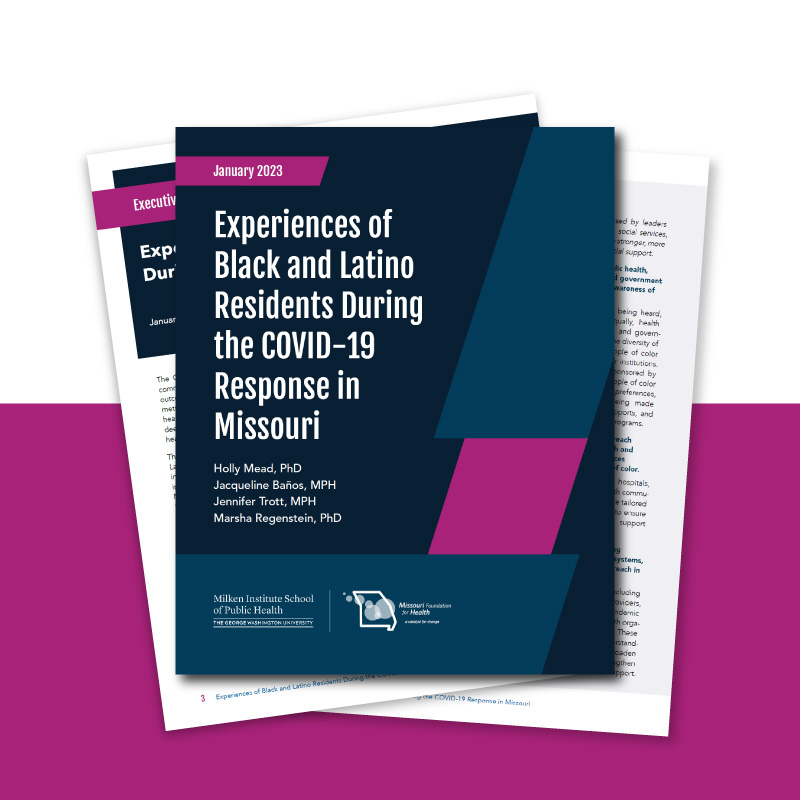This blog was co-authored by Jennifer Trott, MPH, Lead Research Scientist, The George Washington University Milken Institute School of Public Health, Department of Health Policy and Management and Katherine Fritz, PhD, MPH, Vice President of Learning and Research, Missouri Foundation for Health.
While many Missourians see COVID-19 as a threat of the past, Black and Latino communities are still experiencing the lasting impacts of the pandemic. At the height of the pandemic, not only were Black and Latino people more likely to be infected, hospitalized, and die from the disease, they were also more susceptible to the socioeconomic impacts, including job loss, housing insecurity, and economic hardship. As in many other states, COVID-19 has revealed notable systemic inequities in our communities and the public health and health care infrastructures supporting them. Collectively, we’ve been charged with forging a new path that will promote the health of all communities and help Missouri achieve health equity. As we reflect on the third anniversary of this catastrophic event, we’re taking the opportunity to learn from the past as we continue to work toward strengthening and rebuilding our public health systems.
In the summer of 2020, Missouri Foundation for Health partnered with the George Washington University Milken Institute School of Public Health (GW) to assess Missouri’s public health preparedness and response capacities to the pandemic. Since then, we have released regional reports examining responses to the pandemic in the Southwest, Northeast, and St. Louis regions of the state, as well as a statewide report that provides key recommendations for improving Missouri’s public health system.
Now we are releasing a follow-up report that examines the challenges Black and Latino Missourians faced during the early months of the pandemic. The report, authored by GW researchers and consultant Holly Mead, highlights how inequities in response efforts hampered their reach and effectiveness, further exacerbating the pandemic’s impact on Black and Latino communities. This report provides leaders in public health, health care, social services, and government sectors with key lessons that will create stronger, more equitable systems of care by:
- Increasing diversity among public health, health care, social service, and government decision-makers to improve awareness of the needs, preferences, and desires of Black and Latino community members
- Developing communication and outreach strategies that make public health and health care information and services accessible, affirming, and welcoming to Black and Latino community members
- Strengthening local partnerships among public health agencies, health care systems, and community groups to effectively reach and respectfully engage with Black and Latino community members
Although this report conveys the experiences of Black and Latino Missouri residents, its findings and recommendations may be relevant to many other states looking to rebuild community trust and engagement in the wake of the pandemic and within the context of health equity. In fact, many of the lessons of this report are echoed within the recent work and recommendations of The Commonwealth Fund Commission on a National Public Health System and other reports profiling a growing movement to modernize public health.
This report also comes at an opportune time for Missouri, as major investments are being made to improve and reimagine aspects of U.S. state and local public health systems. The American Rescue Plan Act is infusing one-time funding to systems to jump-start this effort. In November 2022, Strengthening U.S. Public Health Infrastructure, Workforce, and Data Systems grants from the CDC equipped the Missouri Department of Health and Senior Services with nearly $50 million in funds to make such investments – $24 million of which is going to the 114 local public health agencies in the state. Those funds are intended to support the development and growth of the public health workforce, strengthen foundational public health capabilities and an ailing infrastructure, and modernize data systems. An intentional, guiding principle of this grant is that all work must be in support of diversity and health equity.
Going forward we must ensure our public health systems are redesigned to serve every Missourian equitably. This means approaching future public health emergencies with modern data systems that nimbly track how marginalized populations are impacted, a workforce that truly reflects diverse communities, and multi-sector partnerships that effectively leverage community voice in decision-making and outreach. This will not come without additional resources and a renewed recognition of the critical role that public health efforts play not only in times of crisis but in our day-to-day lives. And most assuredly, a better, modern public health system will not emerge successfully from the aftermath of COVID-19 without community involvement and trust.
Read the report: Experiences of Black and Latino Residents During the COVID-19 Response in Missouri



